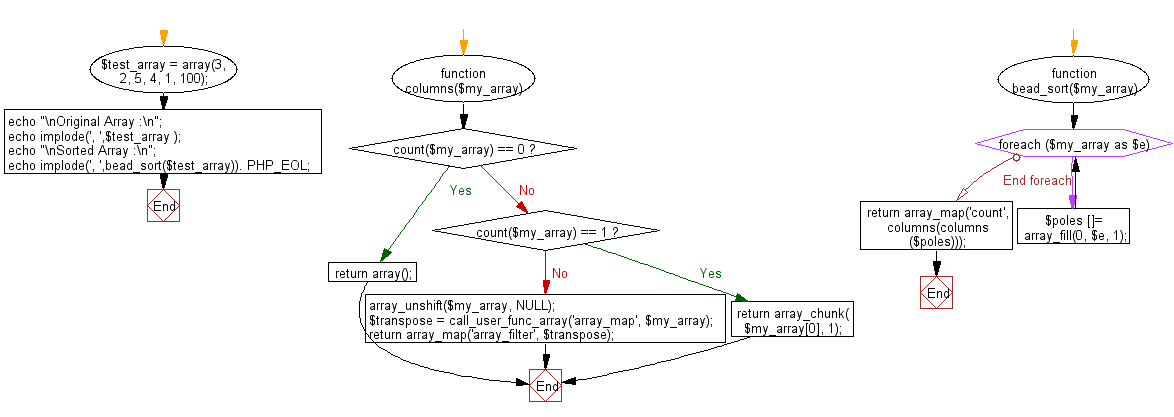PHP Searching and Sorting Algorithm: Bead sort
Write a PHP program to sort a list of elements using Bead sort.
Sample Solution :
PHP Code :
<?php
// Function to convert a multidimensional array into its columnar representation
function columns($my_array) {
// Check if the input array is empty
if (count($my_array) == 0)
return array();
// Check if the input array has only one row
else if (count($my_array) == 1)
return array_chunk($my_array[0], 1); // Split the single row into individual elements
array_unshift($my_array, NULL); // Add a null element to the beginning of the array
// Transpose the array using array_map and call_user_func_array
$transpose = call_user_func_array('array_map', $my_array);
// Filter out null elements from each column
return array_map('array_filter', $transpose);
}
// Function to perform bead sort on an array
function bead_sort($my_array) {
$poles = array(); // Initialize an empty array to represent the poles
// Create poles with beads corresponding to each element in the input array
foreach ($my_array as $e)
$poles []= array_fill(0, $e, 1); // Fill each pole with beads
// Convert the array of poles into its columnar representation and then back into an array
return array_map('count', columns(columns($poles))); // Count the number of beads in each column
}
$test_array = array(3, 2, 5, 4, 1, 100); // Define an example array
echo "\nOriginal Array :\n";
echo implode(', ',$test_array ); // Print the original array
echo "\nSorted Array :\n";
echo implode(', ',bead_sort($test_array)). PHP_EOL; // Print the sorted array
?>
Output:
Original Array :3, 2, 5, 4, 1, 100 Sorted Array : 100, 5, 4, 3, 2, 1
Explanation:
In the exercise above,
- columns function:
- This function takes a multidimensional array as input and converts it into its columnar representation.
- It first checks if the input array is empty or has only one row. If so, it returns the array unchanged or splits the single row into individual elements, respectively.
- It then adds a null element to the beginning of the input array.
- Using "array_map()" and "call_user_func_array()", it transposes the array, effectively converting rows into columns.
- Finally, it filters out any null elements from each column using 'array_filter' and returns the resulting columnar representation.
- bead_sort function:
- This function implements the bead sort algorithm to sort an array of integers.
- It starts by initializing an empty array called '$poles' to represent the poles used in the bead sort algorithm.
- For each element '$e' in the input array '$my_array', it creates a pole with '$e' beads (represented as ones in an array).
- After creating the poles, it converts the array of poles into its columnar representation using the "columns()" function twice.
- Then, it counts the number of beads in each column using array_map('count', ...), effectively sorting the array.
- The sorted counts are then returned as the sorted array.
- Finally the original array is printed and the "bead_sort()" function is called to sort the array. The sorted array is then printed.
Flowchart :

Go to:
PREV : Write a PHP program to sort a list of elements using Radix sort.
NEXT : Write a PHP program to sort a list of elements using Bogo sort.
PHP Code Editor:
Have another way to solve this solution? Contribute your code (and comments) through Disqus.
What is the difficulty level of this exercise?
Test your Programming skills with w3resource's quiz.
